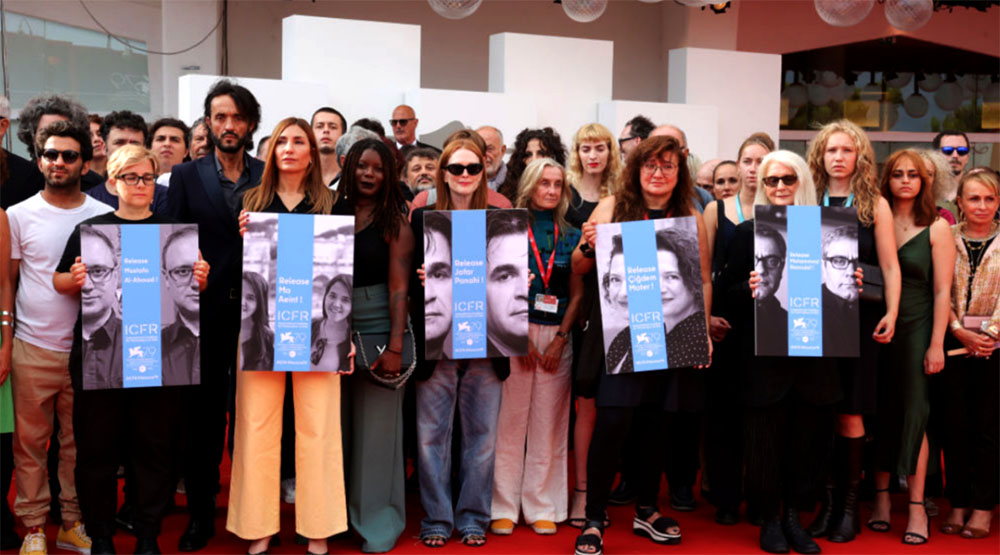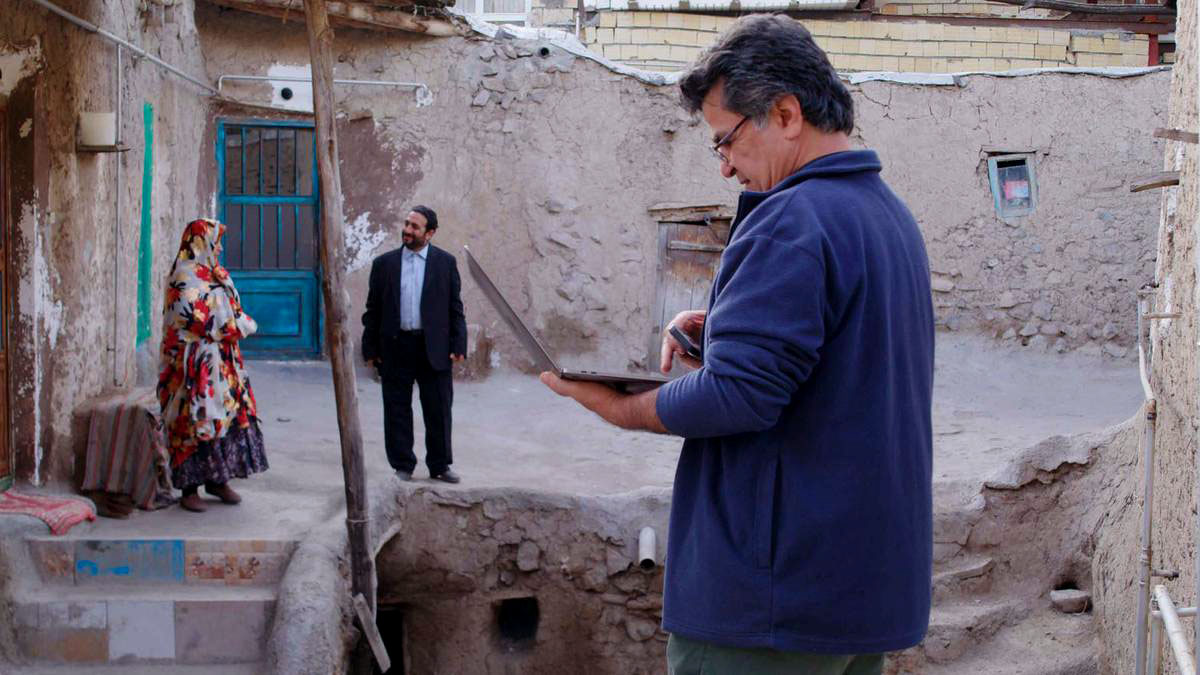Clive Bell
“Where is the border line exactly?” asks Jafar Panahi, playing a film director called Jafar Panahi. “You’re standing on it. Exactly,” replies his production assistant. Panahi steps back in alarm, as if he’s been stung.
The border in question is up in the hills between Iran and Turkey. Here everything is sensitive and dangerous. People smugglers tear up and down the hilly tracks in four-wheel pick-up trucks. Villagers are suspicious of outsiders, particularly outsiders with cameras. A filmmaker is almost guaranteed to stir up trouble, and Panahi’s latest film No Bears explores several varieties of trouble, like poking sticks into a wasps’ nest. Bears in the hills would be one more source of trouble, but, as the title reassures, there are no bears. Everything else is the problem.
This is a feature, not a documentary, though it often looks like one. Panahi, who has been barred from making films or leaving Iran, has made four films since his arrest in 2010. In No Bears he plays a director shooting a film about a couple desperately trying to leave the country, with a plot full of stolen passports and smugglers who conceal their faces. The actors are across the border in Turkey, in a small town. Panahi is nearby in a village on the Iranian side, directing via an internet connection. His wi-fi drops out frequently. He is seen waving his phone hopefully out of a window, or climbing a hill for a better signal, in shots which echo an earlier visitor to a remote village, in a film by Abbas Kiarostami (The Wind Will Carry Us, 1999), seeking a phone signal in order to stay in touch with the outside world.
Historically, filming in Iranian villages is not without its complications. The Cow (1969) directed by Dariush Mehrjui was denied an export permit by its backers. The Ministry of Culture and Arts, under the Shah, considered the film a backwards portrayal of the country. Smuggled to the Venice Film Festival in 1971, it was lauded as the beginning of Iranian New Wave, and awarded a prize. More importantly The Cow, allegedly liked by Ayatollah Khomeini, was the reason Iranian cinema was not banned after the 1979 Islamic Revolution.
In No Bears, Panahi rents a room, which has few right angles. Windows and doors are skewed as he stares out at village life. He is keen to shoot some local color: the feet-washing ceremony in the river, kids playing under the trees. Before he knows it, the village elders accuse him of snapping a young couple, where the girl is betrothed to someone else. He must hand over the photo, but denies having it, and this escalates to the point where Panahi is required to attend a ceremony where he swears on the Qur’an that he’s telling the truth. Of course, infuriatingly, he wants to film this as well.
Meanwhile, the actors across the border rebel against their director. A woman claims the director has tricked her over some stolen passports, and this too spirals out of control. What appeared to be a scripted film morphs into real-life tragedy, and we realize Panahi is playing a complex game with what is real, what is acted, all against a background of genuine borderland danger.

Eluding Censorship
No Bears is steeped in the Iranian tradition of filmmaking that must elude censors and government repression. One way is shooting film in cars, as in Panahi’s own Taxi Tehran (2015), or Kiarostami’s Ten (2002). Another example is Hit the Road (2021) the highly entertaining, comedy debut by Panahi’s son, Panah Panahi. But Hit the Road also has its tragic side, and is another story of fleeing Iran in despair.
In July 2022 three Iranian filmmakers were arrested in one week: Mohammad Rasoulof, Mostafa Aleahmad and Panahi himself, who had gone to the prosecutors’ office to inquire about the well-being and whereabouts of the other two. This time Panahi was sentenced to six years in jail. This six-year sentence was originally handed down in 2010. A conditional release that was granted was now revoked.
Today, the oppressive clamping down by the Iranian authorities, readily offended and quick to violence, has escalated. Still filmmakers fight back. A silent protest was posted on Twitter by Babak Ghafoorniazar, the producer of Sahneh, a weekly cinema and arts program on Radio Farda, the Persian service of Radio Free Europe/Radio Liberty, in Prague. A camera set up in the woods captures the setting. The only sounds to be heard are the birds twittering in the trees. One by one Iranian cinema and theatre actors, both women and men, walk into the frame, and silently regard the viewer. The clip is under a minute. If real-life weren’t so disturbing; it would be a prime example of Iranian New Wave – moving, mysterious and tragic beyond beauty.
In November 2022, more than fifty Iranian filmmakers formed a new Independent Iranian Filmmakers Association, which stands in solidarity with the protestors in the streets, and believes “in the universal language of cinema as a powerful narrator of truth and peace …” The named and unnamed membership, because of the security situation inside Iran, includes: the artist and filmmaker Shirin Neshat; writer, screenwriter and television producer Mostafa Azizi; Abdolreza Kahani, director of Dance with the Moon (2004) and Twenty (2009); Nima Sarvestani, director of Stronger Than a Bullet (2017); Kaveh Farnam, producer, writer and cultural advocate; Ali Abbasi, director and writer of Border (2018), Holy Spider (2022) and Shelley; and Adele Cheraghi, production designer of Botox (2020) and Retouch (2017).
While some film and television makers are committed to the struggle, others hedge their bets. There have been reports coming out of Tehran of multiple takes of the same production – with women actors in hijabs, without hijabs or wearing wigs.
Getting government permission to shoot a film in Iran requires a steadiness of purpose. In order to obtain the requisite permits to make Hit the Road, Panah Panahi presented officials with a swiftly concocted script about a landowner near the border falling in love with a local woman. “Everyone submits these dummy scripts,” he told The Guardian this summer, “and there are no consistent directives to follow, just the whims of the official handling your case. You cannot imagine how crazy the whole system is. We’re confronted with this heterogeneous, unpredictable, completely illogical system. The only way to survive it is to be just as hypocritical as they are.”
After the cheerful ironies of Taxi Tehran, in which Jafar Panahi drew humor from masquerading as a taxi driver and getting recognized (or not) by his bemused passengers, No Bears is a film full of jeopardy. The young villager is furious that his traditionally correct betrothal has been cast aside, and sets out to kill his rival, while the female actor cannot bear her situation any longer. Panahi is stuck in the middle and his every attempt at action makes things worse. Eventually the villagers kick him out. And yet Panahi’s bemused, stoic countenance – puzzled at so much crazy behavior, refusing to be cornered or compromised, lighting one more cigarette–is what lingers long after the film ends.




